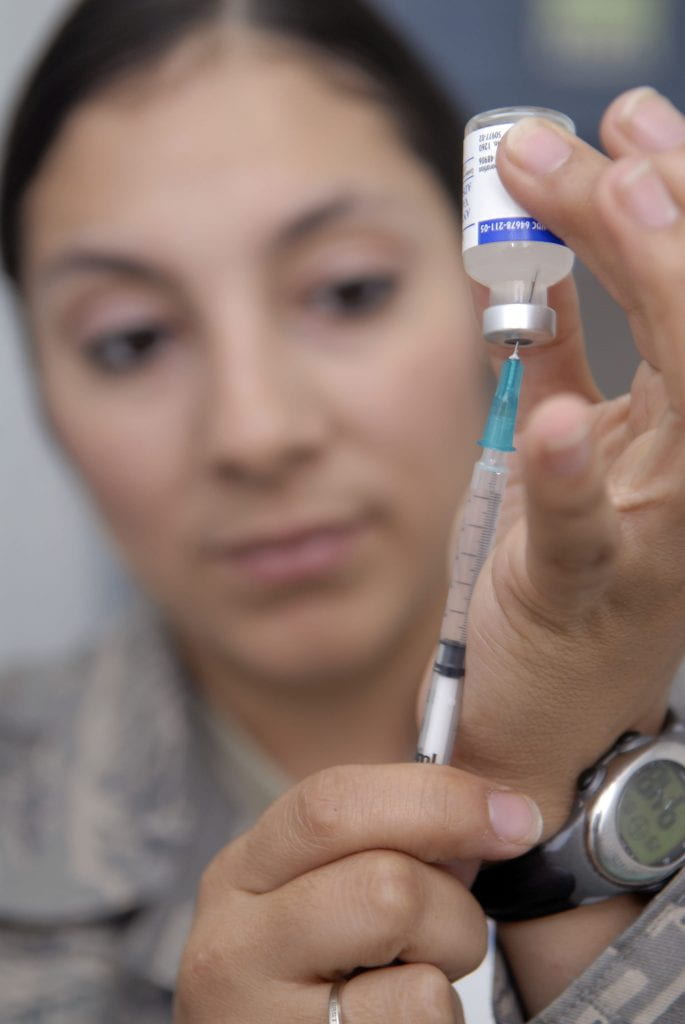by Pam Zuber

“We cannot say this enough: Vaccines are a safe and highly effective public health tool that can prevent this disease and end the current outbreak,” Alex M. Azar II, U.S. Health and Human Services Secretary, 2019.
Despite Secretary Azar’s comments, it looks as if many people aren’t heeding his words. According to the Centers for Disease Control and Prevention (CDC), there have been more than 1,000 cases of measles in the United States from January through mid-June 2019, a period of only about five and a half months. The CDC blames the outbreak on misinformation relating to vaccines.
Should school systems and governments require people to receive vaccinations for measles and other conditions? Do vaccines protect the health and rights of others? If authorities require people to receive vaccinations, does this requirement violate people’s civil rights and impair their ability to make decisions about medical treatment for themselves and their families?
What are vaccines? Why do people support or criticize vaccines?
Vaccines are substances that spur the immune system to produce antibodies to fight diseases. This way, if people encounter diseases later in their lives, their bodies will already contain antibodies that will help them fight them. Vaccinations are the process in which people receive vaccines, often through injections, ingesting agents orally (such as in the form of drops or tablets), or inhaling them in the form of nasal sprays.
To create vaccines, manufacturers use weakened or dead versions of the same germs that cause the disease. They also use other substances, including mercury, formaldehyde, and aluminum. The inclusion of such ingredients has been controversial and have led some people to refuse vaccinations for themselves or their children. While high levels of these substances are indeed dangerous, experts say that the small amounts of such substances found in vaccines do not pose significant risks to people.
A famous (many say infamous) 1998 study disagreed with reassurances about vaccines. It said that there was a link between vaccinations and autism in children. The paper proved extremely popular and fueled efforts against vaccination. Known as the anti-vaxxer or anti-vaxxing movement, this movement remains strong today, despite many other studies that have refuted the claims of the 1998 paper and allege that vaccinations do not, in fact, cause autism.
Fears that vaccines have toxic ingredients and may cause autism to persist. Such fears have led more parents to refuse vaccines for themselves or for their children. Public school systems require students to receive vaccinations to attend their schools, although they do allow students to opt out of vaccinations for certain reasons, such as religious beliefs or health concerns. Many parents have taken these exemptions in recent years, which leads to lower vaccination rates.
Money is another reason people do not give or receive vaccines. Doctors may not be reimbursed for giving vaccinations. Parents may not have money to pay for such vaccinations or the ability to leave work to take their children for immunizations. To counter those obstacles, a number of public health departments offer vaccinations for free or reduced costs. Other government agencies and private companies provide access to immunizations in a variety of settings, such as immunization fairs that offer vaccinations, health information, fun activities, and transportation to such events.
How do vaccines relate to human rights?
For other people who criticize vaccines, using or not using the substances are a matter of rights. They question whether governments and other entities should determine medical decisions for others. Members of organizations such as the National Vaccine Information Center claim that governments that criticize people for not receiving immunizations are no better than dictatorial, oppressive entities such as the Third Reich. This is because people who do not pursue vaccinations are in the minority compared to the people who do seek such vaccinations. In this view, government entities that criticize such minorities – or even force minorities to seek vaccinations, such the Cambridge, Massachusetts Board of Health that required smallpox vaccinations in the U.S. Supreme Court decision Jacobson v. Massachusetts – are as dangerous as Nazi Germany.
What about the rights of people who contract or may contract diseases that vaccines may prevent? After all, immunizations protect many more people than the people who physically receive the vaccinations. Widespread vaccinations may produce a phenomenon known as herd immunity or community immunity. This occurs when diseases can’t affect a community because so many people have been immunized against the diseases. The diseases die a natural death because they can’t gain a foothold.
Herd immunity is especially useful because not all people can receive immunizations. Some people are too young to receive immunizations. Or, if people have compromised immune systems, they’re too weak to receive vaccinations. If they’re too weak to receive vaccinations, they’re definitely susceptible to diseases. When other, healthier people in their communities are immunized, they won’t contract diseases and thus won’t be able to transmit diseases to unvaccinated people with weakened immune systems.
More unvaccinated people in communities means more people may contract highly contagious diseases such as measles. If they can’t receive vaccinations, there’s a good chance that they’ll become infected and develop such diseases. People who couldn’t receive vaccinations didn’t choose to be sick. Have their human rights been violated? Others who have opted against receiving vaccinations or having their children vaccinated when they were eligible to receive vaccinations did make such choices. Are they exercising their human rights to make decisions for themselves? Are they violating the rights of others by potentially exposing them to disease?

How do vaccines affect the community?
It appears that refusing vaccines may indeed harm the greater interests of the community and infringe on human rights. We all have to do many things to serve the greater good, even if we don’t want to do them. We have to stop at streetlights, even though we want to keep driving. We have to pay taxes to fund various government programs, even though we want to keep our hard-earned money. Why shouldn’t vaccinations be any different?
Shots may hurt physically. They may cost money and may be inconvenient, since we may have to take time off from work or school to receive vaccinations. But we may be even more physically uncomfortable if we contract the diseases vaccinations could have prevented. If we’re sick with the diseases, we may miss even more work or school than the vaccination appointments would have taken. If vaccinations are expensive, so are medications and visits to doctors, urgent care facilities, emergency rooms, and other medical facilities that are needed to treat diseases that vaccinations could have prevented.
Not having vaccinations may thus cost diseased people time and money. If they pass these diseases to others, they also pass these costs to others. Since many vaccines prevent diseases that are highly contagious, there’s a good chance that they’ll give these diseases to others. According to the Centers for Disease Control and Prevention (CDC), “Measles is so contagious that if one person has it, up to 90 percent of the people close to that person who are not immune will also become infected.”
Vaccines may prevent this. “In the USA, there has been a 99 percent decrease in incidence for the nine diseases for which vaccines have been recommended for decades,” noted the World Health Organization (WHO). The organization added that the country has also witnessed dramatic declines in mortality and pathological conditions related to such diseases.
People die from the measles. It’s not just an annoying, uncomfortable disease that kids pass among themselves. It’s a potential killer, one we may easily stop. The Declaration of Independence famously said that we are entitled to the unalienable rights of life, liberty, and the pursuit of happiness. Vaccines protect life, give people liberty by enabling healthy and active lives, and promote happiness by preventing the devastation caused by sickness and death. They support human rights and are vital weapons in the public health arsenal.
Pamela Zuber is a writer and an editor who has written about human rights, health and wellness, gender, and business.
